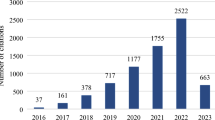Abstract
This paper develops a multi-criterion genetic optimization for solving distribution network problems in supply chain management. Distribution problems deal with distribution from a number of sources to a number of destinations, in which various decision factors are closely related and influence each other. Genetic algorithms have been widely adopted as the optimization tool in solving these problems. This paper combines analytic hierarchy processes with genetic algorithms to capture the capability of multi-criterion decision-making. The proposed algorithm allows decision-makers to give weightings for criteria using a pairwise comparison approach. The numerical results obtained from the new approach are compared with the results obtained from linear programming. The result shows that the proposed algorithm is reliable and robust. In addition, it provides more control for decision-makers on the determination of the optimization solutions, and gains more information for a better insight into the distribution network.
Similar content being viewed by others
References
Marcel M, Evers JJM (1996) Distribution network design: an integrated planning support framework. Logistics Inf Manage 9(11):85-58
Yrjölä H (2001) Physical distribution considerations for electronic grocery shopping. Int J Phys Distrib Logistic Manage 31(10):786-761
Alshawi S (2001) Logistics in the Internet age: towards a holistic information and processes picture. Logistics Inf Manage 18(8):235-281
Stank TP, Goldsby TF (2000) A framework for transportation decision making in an integrated supply chain. Logistics Inf Manage 5(2):71-77
Milgate A (2001) Supply chain complexity and delivery performance: an international exploratory study. Supply Chain Manage Int J 6(3):106-118
Wilson I (1995) Distribution control systems within the supply chain. Logistics Inf Manage 8(3):80-82
Chakraborty M, Gupta S (2002) Fuzzy mathematical programming for multi objective linear fractional programming problem. Fuzzy Sets Syst 125(3):335-382
Mármol AM, Puerto J, Fernández FR (2002) Sequential incorporation of imprecise information in multiple criteria decision process. Eur J Oper Res 137(1):123-133
Abdinnour-Helm S (1999) Network design in supply chain management. Int J Agile Manage Syst 1(2):99-106
Vignaux GA, Michalewica Z (1991) A Genetic Algorithm for the Linear Transportation Problem. IEEE Trans Syst Man Cybern 21(2):445-452
Glover F (1986) Future paths for integer programming links to artificial intelligence. Comput Oper Res 13(5):533-589
Glover F (1989) Tabu Search part I. ORSA J Comput 1(3):190-206
González EL, Fernández MA (2000) Genetic optimization of a fuzzy distribution model. Int J Phys Distrib Logistic Manage 30(7/8):681-696
Miznuma H, Watada J (1995) Fuzzy mixed integer programming based on genetic algorithm and its application to resource distribution. Jpn J Fuzzy Theory Syst 7(1):97-116
Hoek RIV, Chong I (2001) Epilogue: UPS Logistics – practical approaches to the e-supply chain. Int J Phys Distrib Logistics Manage 31(6):863-868
Ballou RH (1999) Business Logistics Management, 8th edn. Prentice Hall, NJ
Dano S (1972) Linear programming, 3rd edn. Springer-Verlag/Wien
Saaty TL (1980) The Analytic Hierarchy Process. McGraw-Hill, NY
Teltumbe A (2000) A framework for evaluating ERP projects. Int J Prod Res 38(17):8507-8520
Saaty TL (1994) Fundamentals of decision making and priority theory with the analytic hierarchy process. The Analytic Hierarchy Process Series, Vol. 6, RWS Publications, 1994
Dawid H (1996) Adaptive Learning by Genetic Algorithms Analytical Results and Applications to Economic Models, Lecture Notes in Economics and Mathematical Systems 881. Springer, Berlin Heidelberg New York
Al-Hakin L (2000) A note on A genetic algorithm approach for multiple criteria facility layout design. Int J Prod Res 38(8):985-989
Al-Hakin L (2001) An analogue genetic algorithm for solving job shop scheduling problems. Int J Prod Res 39(7):1537-1588
DeJong KA (1975) An analysis of the behavior of a class of genetic adaptive system, Doctoral dissertation, University of Michigan
Onwubolu GC, Kumalo T (2001) Optimization of multipass turning operations with genetic algorithms. Int J Prod Res 39(16):3727-3785
Onwubolu GC, Muting M (2001) Optimizing the multiple constrained resources product mix problem using genetic algorithms. Int J Prod Res 39(9):1897-1910
Author information
Authors and Affiliations
Corresponding author
Rights and permissions
About this article
Cite this article
Chan, F., Chung, S. Multi-criteria genetic optimization for distribution network problems. AMT 24, 517–532 (2004). https://doi.org/10.1007/s00170-002-1445-5
Received:
Accepted:
Published:
Issue Date:
DOI: https://doi.org/10.1007/s00170-002-1445-5




